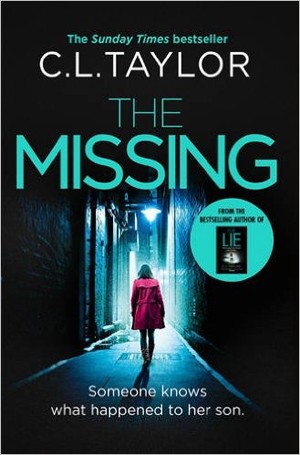
CL Taylor is becoming an important voice in the growing sub-genre of domestic noir. Last year, The Lie rocked the Amazon charts, and was one of our Recommended books. It looked at female relationships, and a woman who had changed her identity entirely. The Missing tackles a different theme, one that plays on our fears as parents. Will our children grow apart from us, make the wrong choices and run away? Will we lose them forever? For how long can we keep them safe?
Billy Wilkinson was just 15 years old when he went missing in Bristol six months ago. The strain of his disappearance and the feelings of guilt that each family member has is threatening to break them apart, especially when a second televised appeal ends in disaster. His mother, Claire, refuses to believe he is gone, while his father feels it’s time they faced up to the fact he may be dead. His grandparents have organised a campaign to find him, complete with Facebook page and crowdfunding site. Older brother Jake fought with Billy the day he disappeared, and both boys seem to have struggled with the old-style authoritarianism of their father. Jake’s girlfriend Kira has moved in with the family to escape her own traumatic home situation, but finds that this apparently happy home is full of secrets, reproaches and regrets.
We see most of the events, past and present, through Claire’s eyes, and she seems a refreshingly down-to-earth person, although prone to much over-analysing and worrying. But then we discover that Claire has states of disassociative amnesia – the fugue that Agatha Christie once famously suffered from, when she disappeared for eight days. The author acknowledges she took some liberties with the condition, by making it a repetitive occurence for Claire. They usually happen only once in a lifetime or at very long intervals. As a storytelling device, the fugues she goes into make us doubt her reliability as a narrator. What is she running away from? What does she fear? Could it be that in her heart of hearts she knows who is to blame for Billy’s disappearance?
Between these chapters we also find some transcriptions of Billy’s What’s App conversations from before Billy went missing. They become increasingly disturbing and graphic. Some of the events and types of people involved are easy to anticipate as you read, but the observations of characters and their interactions are excellent. My one criticism would be that perhaps too many issues are not tackled in sufficient depth. The ending, while not exactly happy, is also a little difficult to believe. Could the extended family still somehow carry on, even after all the resentments and secrets that have been festering between them have been revealed?
It could be argued that women writers prefer the ‘small canvas’ of domestic noir, but in fact these are universal themes. Everyone struggles with them and can relate to them. We may not all be parents, but we have all been someone’s child, we have all disagreed with our parents and fought for our own emancipation. By looking at families and the difficulties in communicating with those nearest and dearest to us, the author touches a fundamental raw nerve. In a crowded landscape of so-called domestic noir thrillers, most of which rely on clever twists and big reveals, this one stands out for its subtle and thoughtful analysis of the fallout from a loss in the family.
Series have become so popular in crime fiction, that it is a refreshing relief to come across an author who publishes standalone psychological thrillers. Her first book The Accident also started from the premise of the fragile relationship between teens and parents, while her second The Lie examined female friendships. Long may CL Taylor continue to introduce us to dysfunctional families, noxious secrets and personal torment!
Avon
Print/Kindle/iBook
£2.99
CFL Rating: 4 Stars









